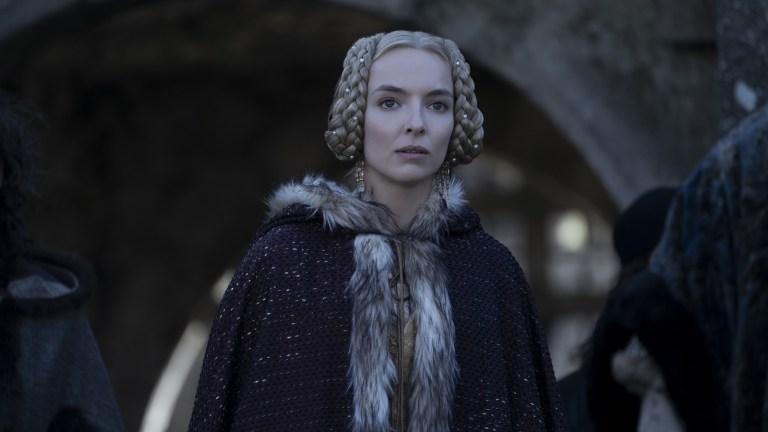The Last Duel Review: Ridley Scott’s Most Timely Historical Epic
The Last Duel, Ridley Scott’s gripping and bloody historical epic, relates an incident from three different points of view. Which works, even if that may be one view too many.

Ridley Scott loves his historical dramas: from Gladiator to Kingdom of Heaven, to even his stony faced Robin Hood, the director may be the last filmmaker still interested in making classic Hollywood epics based at least on partially real-life ancient events or figures. What perhaps differentiates his latest such film, The Last Duel, from some of those others mentioned above is that this time, the story is directly relevant to today, even if it takes a while for Scott to get to the point.
Based on a book by Eric Jager of the same name, which chronicled certain events in late 14th century Normandy, The Last Duel stars Matt Damon as Jean de Carrouges, a knight and landowner known for his courage on the battlefield in service of the King. Carrouges is friends with Jacques Le Gris (Adam Driver), a somewhat more cultured nobleman who has caught the attention of the King’s cousin, a local count named Pierre d’Alencon (Ben Affleck).
Carrouges’ and Le Gris’ friendship is strained, however, when d’Alencon sides with Le Gris in a dispute over a parcel of land originally promised to Carrouges by Sir Robert de Thibouville (Nathaniel Parker), the father of Carrouges’ young bride Marguerite (Jodie Comer). The land is awarded to Le Gris by d’Alencon, who also puts the squire in charge of his affairs. Carrouges is further humiliated when he’s expelled from the court after losing his temper. But the worst is yet to come.
After Carrouges returns from another military campaign, he is informed by Marguerite that Le Gris turned up at their home and raped her. Le Gris denies the charges, but Carrouges takes his complaint all the way to King Charles VI (Alex Lawther), who authorizes a trial by combat—a duel to the death—between Carrouges and Le Gris to determine which side speaks the truth. But what Carrouges does not tell his wife until the showdown is set is that that if he loses, Marguerite herself faces a horrific fate beyond imagining.
The Last Duel takes the Rashomon route of telling the story from three different points of view, or each person’s “truth.” The first section is told from Carrouges’ perspective and, of course, paints Damon’s prickly knight in the most flattering light as a dedicated soldier, loving husband, and loyal friend who is betrayed at every turn but who nevertheless believes and supports his wife, unconditionally. The second portion of the film is Le Gris’ version of events, in which Carrouges is seen as a self-pitying pariah, and Marguerite’s response to Le Gris’ assault is, just slightly, more ambivalent.
The third portion of the film belongs to Marguerite, and in the end, that is the only truth that matters. While the men bicker and puff themselves up and nurse their wounded egos and pride, she is the one who has been truly violated and the one who has the most courage, since she speaks up—and never backs down—during a time when the consequences for her are literally life and agonizing death.
The Last Duel’s power comes from the way that Marguerite’s struggle to be heard and to have the truth come out is almost a mirror image of the way events have played out in modern times and in the wake of the #MeToo movement. Fortunately, Comer — the fantastic Killing Eve actor on the rise — skirts the limitations of the script to make Marguerite a fully formed human being. The problem is that she only gets to this mainly in the third act, during “her” story, and she remains a cypher earlier in the film.
The first two sections are devoted to the men, and even though the events are mostly the same, there are subtle differences throughout: Damon’s Carrouges becomes less of a hero and more of a self-absorbed hothead as the film goes on (“Why does this man do nothing but evil to me?” he screams in the third section, after his wife, the actual victim, informs him of the rape). Meanwhile the predator beneath Le Gris’ slick veneer recedes in his recollection of events (Marguerite put up the “customary protests,” he tells d’Alencon at first, implying that the rest was just fine).
The script was co-written by Damon, Affleck, and Enough Said director-writer Nicole Holofcener, with each handling a specific character’s tale. And even though much of The Last Duel is gripping as drama and rich in subtext, one wishes that there was a way to somehow combine the first two sections so that this two-and-a-half hour film could get to the heart of the matter—one lonely woman’s stand for the truth in a time when her voice was barely acknowledged—just a bit sooner.
Nevertheless, there’s a lot of powerful material here, and Scott seems to be his most focused since 2015’s The Martian. The period details, costumes, and settings are pretty much on point throughout (a couple of dodgy CG landscapes or crowd scenes aside), and the director is aided enormously by his remarkably assured and superb cast. We were initially filled with dread at the idea of Damon and Affleck in period wigs, but Damon brings a lot of shading to the different views of Carrouges while Affleck is surprisingly strong and genuinely funny as the decadent, dissolute d’Alencon. Driver is excellent as always; he seems like the kind of timeless actor who can handle almost anything. And Comer centers the movie with a quietly moving power in her Marguerite.
It’s no spoiler to say that the film climaxes with the title conflict, a gory, grueling, and ugly battle that reduces Carrouges and Le Gris to grunting, clawing savages (if the real-life duel was anything like this, it’s probably no wonder that it was the last trial by combat ever officially sanctioned in France). If this is the way that justice used to be meted out, with “God” deciding the winner, then we can probably say that we’ve made at least a little progress. But at a time when women’s private medical decisions are treated in some parts of this country like criminal acts, The Last Duel reaches back into the past for a forceful reminder that we haven’t come far enough.
The Last Duel is out in theaters this Friday, Oct. 15.


